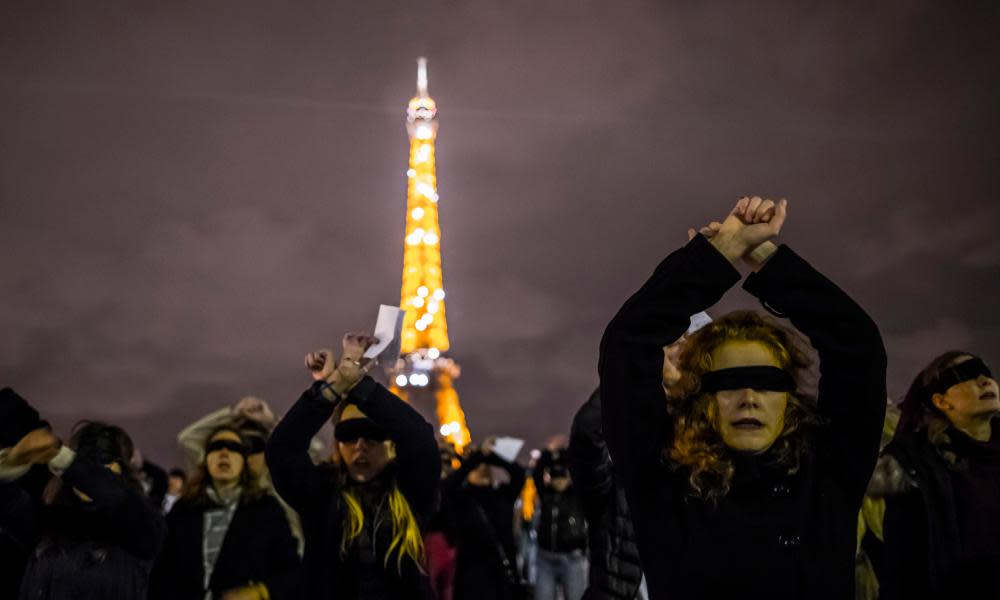Chilean anti-rape anthem becomes international feminist phenomenon

A Chilean protest song about rape culture and victim shaming has become a viral anthem for feminists around the world.
Related: Chile security forces' crackdown leaves toll of death and broken bodies
Un Violador en Tu Camino – A Rapist in Your Path – was first performed in late November as Chile’s nationwide uprising against social inequality pushed into its second month.
Videos of the song – and its accompanying dance moves – quickly went viral, spreading across Latin America and the world, with performances taking place in Mexico, Colombia, France, Spain and the UK.
The song was written by Latesis, a feminist theatre group based in the city of Valparaíso, who credited Chile’s women protesters for helping spread the work around the world.
“It was never intended to be a protest song – the women of the marches transformed it into something more” said Paula Cometa, speaking on behalf of the group, whose other members are Sibila Sotomayor, Daffne Valdés, and Lea Cáceres.
"Un violador en tu camino", convocatoria Red de Actrices Chilenas @RACH, frente al Museo Chileno de Arte Contemporáneo (Santiago, Chile)#LasTesis pic.twitter.com/b6zRtbHsZ4
— Adri (@fixasttyles) November 30, 2019
A Rapist in Your Path is based on the work of the Argentinian theorist Rita Segato, who argues that sexual violence is a political problem, not a moral one.
The lyrics describe how institutions – the police, the judiciary and political power structures – uphold systematic violations of women’s rights: “The rapist is you/ It’s the cops/ The judges/ The state/ The president.”
Another section repudiates the many ways that women are blamed for falling victim to sexual violence (“And it’s not my fault / nor where I was / nor what I wore”) before concluding: “The rapist is you.”
According to statistics compiled by the Chilean Network Against Violence Against Women, 42 cases of sexual abuse are reported each day to the police (approximately two every hour). In 2018, only 25.7% of sexual abuse cases resulted in judicial rulings.
“In the Chilean judicial system, stereotypes and biases harm women victims of sexual violence,” said Bárbara Sepúlveda Hales, spokeswoman for the feminist lawyer group Abofem. “In many trials, the life and sexual behavior of the victim is exposed as if it were a justification for the aggression they suffered.”
Although the song was written before the wave of unrest and repression erupted in October, Cometa said that the choreography reflects the crisis in which security forces have faced widespread allegations of rape, torture and shooting to kill.
“It adapted to the moment that we are now living in Chile. The violence and the human rights violations that women have been exposed to recently,’’ she said.
Related: Poet, hero, rapist – outrage over Chilean plan to rename airport after Neruda
In one part of the song, performers squat down in an echo of a position which female protesters are forced to assume on arrest. “It’s a simple form of torture and punishment carried out by the Chilean police,” Cometa said.
Chile’s largest performance of the song took place on Thursday night outside Santiago’s National Stadium – which became notorious as a prison camp and torture centre after the 1973 military coup which brought Augusto Pinochet to power. An official report on human rights during the dictatorship found that almost every one of the female victims interviewed had suffered some form of sexual violence.
Thursday’s performance brought together thousands of women, including older chilenas who lived through the dictatorship and their younger counterparts protesting today.
“They held prisoners here, women who were harassed and sexually tortured,” said Victoria Gallardo, 71, who was participating in the event. “I cried the first time I heard Un Violador en Tu Camino. I’m so proud of the young women of today – and this performance represents us all.”

 Yahoo News
Yahoo News 
